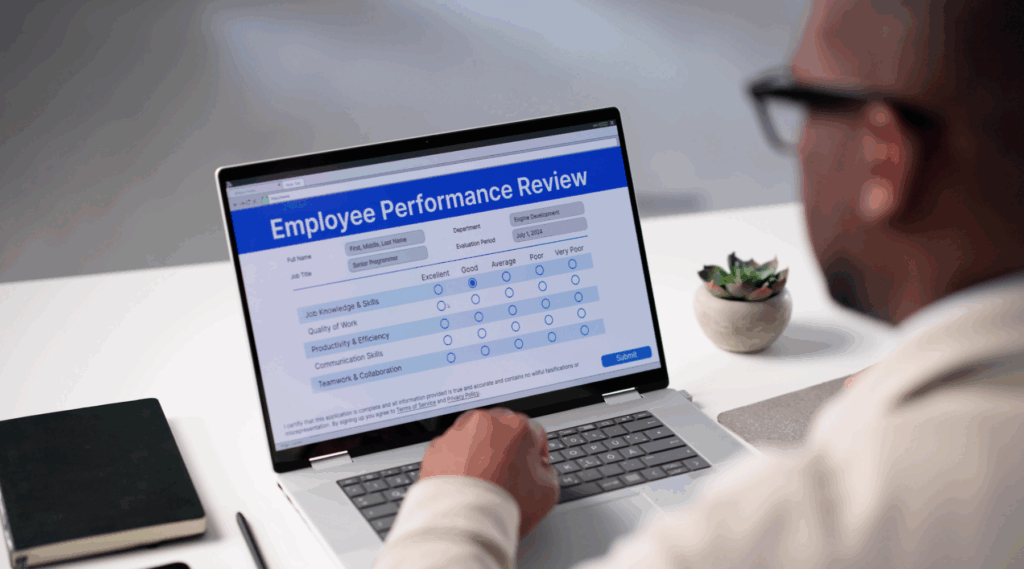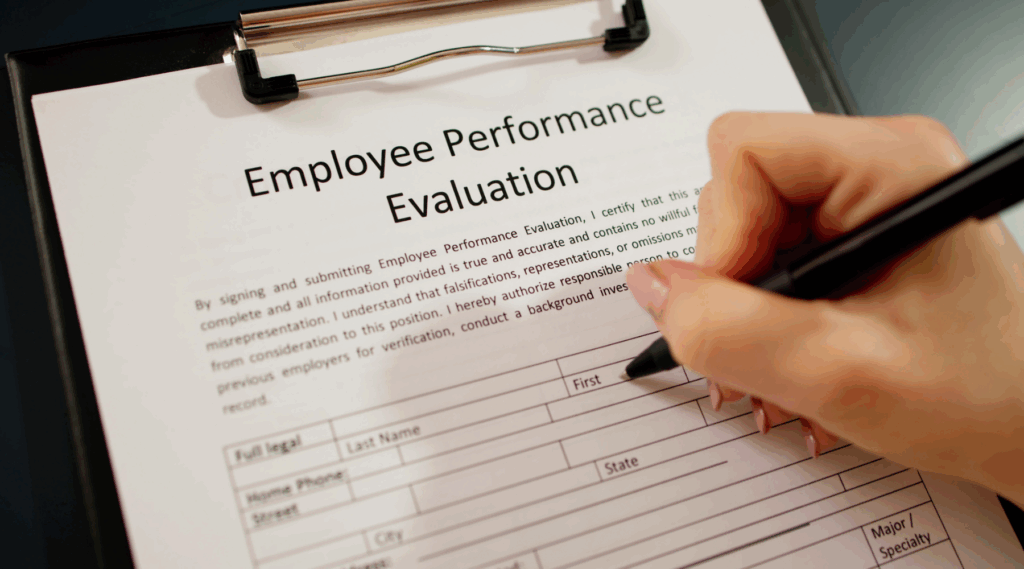
Performance reviews don’t have to be dreaded by managers or feared by employees. When done well, they can boost motivation, strengthen trust, and align individual goals with company objectives. The key is shifting away from awkward, one-sided evaluations and toward meaningful conversations that focus on growth. By preparing thoughtfully, delivering clear feedback, and highlighting the future rather than dwelling on the past, performance reviews can become one of the most valuable tools in your leadership toolkit.
What You’ll Learn:





No manager looks forward to performance reviews; in fact, some dread even the thought of them. For employees, the idea of “sitting down for feedback” can cause sleepless nights and a high degree of anxiety. Surprise! Reviews don’t have to be awkward or demoralizing. When handled thoughtfully, they can be one of the most effective tools for keeping people motivated, and their individual professional goals aligned with the bigger picture of the company.
The challenge, of course, is delivering constructive performance feedback in a way that’s clear and honest without being discouraging. That balance comes down to preparation, communication, and focusing on the future rather than simply dwelling on what went wrong or is missing.

Giving feedback is like providing the employee with a GPS for a long road trip. Without it, employees are busy driving but have no idea if they’re headed in the right direction. Honest feedback gives people clarity on where they stand and how they can improve. It also helps tie individual performance to company goals. When someone understands how their role directly supports the larger mission, they’re more engaged.
When employees receive meaningful constructive performance feedback each week, 80% report being fully engaged, showing that timely, constructive guidance truly fuels growth and motivation. Engagement leads to higher productivity, less turnover, and stronger collaboration.
Reviews go smoother when there’s a structure everyone understands. That usually means:
To set clear goals, use the “SMART” approach where goals are written in a Specific, Measurable, Attainable, Relevant and Time-Bound format. This could look like, “Increase widget production from 10 to 12 widgets per hour with a maximum of one mistake.” SMART goals ensure that the manager and employee are on the same page and reduces “rater bias.” On the flip side, vague comments like “be friendlier with clients” or “improve your attitude” aren’t helpful. They’re like a recipe that says “fold in the cheese” without explaining how. That lack of specificity leaves people frustrated rather than motivated.
Preparation is where the real work happens. Go into the meeting with examples (both strengths and areas that need improvement, for example), so the conversation is grounded in reality, not opinion. For instance, saying “Your last three reports didn’t include variance analysis, which delayed financial forecasting” is far more useful than “Your reports need more detail.”
Mindset matters too. If a manager treats reviews like a chore or a punishment, the employee will feel it. Walking in with the goal of supporting growth sets a much more positive tone.

No one likes tough feedback, but avoiding it isn’t fair to the employee or the team. The best approach is to be clear, respectful, and specific. One helpful method is the SBI Model: Situation, Behavior, Impact.
Example:
Notice how this stays focused on observable actions and their outcomes, not personality traits. It also leaves space for a solution-oriented discussion. Pair this with open-ended questions like, “How do you think we can handle that better next time?” to keep the conversation collaborative.
The line between being honest and being discouraging can feel thin. One way to keep from crossing it is to balance acknowledgment with constructive direction. Start by recognizing contributions, then move into where improvement is needed. It’s not about cushioning the blow with empty praise, but about showing that you see the whole picture.
Also, avoid leaving people hanging. Telling an employee what went wrong without showing them how to fix it is demotivating. Suggest actionable next steps and, if possible, offer resources or support to help them improve. This turns what could feel like a dead end into a path forward.
People tend to respond better when feedback points forward. Instead of dwelling on past mistakes, connect feedback to future opportunities. For example: “Your analytical skills are strong. If you focus on developing how you present those insights to clients, you’ll be ready for leadership opportunities in the next year.”
This approach makes feedback feel less like criticism and more like coaching. It also helps employees see how their growth ties into the company’s bigger picture, which is motivating on its own.

Employees are quick to pick up on whether reviews feel fair. That’s why objectivity is so important. Stick to measurable data, documented examples, and established performance standards. Adding in peer or 360-degree feedback, where possible, also helps create balance.
Harvard Business Review has pointed out that vague or inconsistent feedback often harms women and underrepresented groups the most. The more specific and measurable your evaluations are, the fairer and useful they become.
Performance Improvement Plans (PIPs) often get a bad rap as a prelude to termination, but when used properly, they can be supportive tools. A good PIP clearly lays out expectations, sets measurable goals, and provides resources for improvement.
For example, if someone struggles with meeting deadlines, a PIP could include project management training and weekly check-ins to build better habits. When framed this way, it’s less about punishment and more about helping the employee succeed.
The best reviews don’t feel one-sided. Encourage employees to share their perspectives and goals. Questions like, “What support would make this easier for you?” or “Where do you see opportunities to grow in your role?” turn the process into a two-way dialogue.
Active listening (making eye contact, paraphrasing their points, and showing genuine interest) signals respect. Even when the feedback is tough, people are more likely to stay engaged if they feel heard.
Performance reviews are evolving to focus on growth, clarity, and business impact. By giving constructive performance feedback that’s specific, actionable, and future-focused, managers can help employees understand what’s going well, where to improve, and how their work contributes to bigger goals, turning reviews into motivating, productive conversations.
If you want to make the most of performance reviews and build a culture where feedback drives engagement and results, the team at Next Level Strategies can help. Reach out today by filling out the form below or calling 415-876-NEXT, and let us help you put clear, constructive, and outcome-focused review practices in place for long-term success.
Reach out to our team of HR experts today!
Focus on specific behaviors, tie feedback to outcomes, and pair it with actionable steps for improvement while maintaining a supportive tone.
Start with positive accomplishments, discuss areas for growth with clear examples, and end with actionable goals and next steps tied to business outcomes.
Managers should provide feedback frequently, ideally weekly or after key projects, to keep it timely, relevant, and actionable.